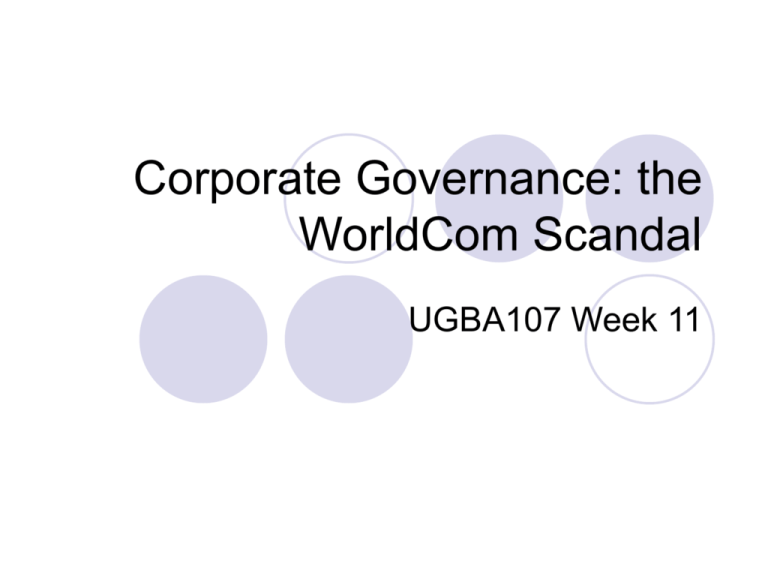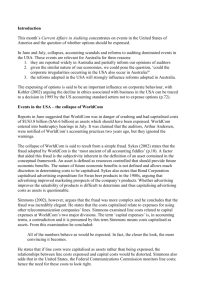Corporate Governance: the Worldcom Scandal
advertisement

Corporate Governance: the WorldCom Scandal UGBA107 Week 11 Agenda for the day Discuss essay questions from the midterm Corporate Misfeasance What is Corporate Governance? How can we improve Corporate Governance? Midterm Results Corporate Governance Definitions of Corporate Governance "Corporate governance is a field in economics that investigates how to secure/motivate efficient management of corporations by the use of incentive mechanisms, such as contracts, organizational designs and legislation. This is often limited to the question of improving financial performance, for example, how the corporate owners can secure/motivate that the corporate managers will deliver a competitive rate of return", www.encycogov.com, Mathiesen [2002]. This definition can be illustrated as a transaction cost based theory of the managerial agency problem. “Corporate governance deals with the ways in which suppliers of finance to corporations assure themselves of getting a return on their investment”, The Journal of Finance, Shleifer and Vishny [1997, page 737]. "Corporate governance is the system by which business corporations are directed and controlled. The corporate governance structure specifies the distribution of rights and responsibilities among different participants in the corporation, such as, the board, managers, shareholders and other stakeholders, and spells out the rules and procedures for making decisions on corporate affairs. By doing this, it also provides the structure through which the company objectives are set, and the means of attaining those objectives and monitoring performance", OECD April 1999. OECD's definition is consistent with the one presented by Cadbury [1992, page 15]. "Corporate governance - which can be defined narrowly as the relationship of a company to its shareholders or, more broadly, as its relationship to society -….", from an article in Financial Times [1997]. "Corporate governance is about promoting corporate fairness, transparency and accountability" J. Wolfensohn, president of the Word bank, as quoted by an article in Financial Times, June 21, 1999. “Some commentators take too narrow a view, and say it (corporate governance) is the fancy term for the way in which directors and auditors handle their responsibilities towards shareholders. Others use the expression as if it were synonymous with shareholder democracy. Corporate governance is a topic recently conceived, as yet illdefined, and consequently blurred at the edges…corporate governance as a subject, as an objective, or as a regime to be followed for the good of shareholders, employees, customers, bankers and indeed for the reputation and standing of our nation and its economy” Maw et al. [1994, page 1]. What is Corporate Governance? A generic term which describes the ways in which rights and responsibilities are shared between the various corporate participants (In the US, especially the management and the shareholders). Discussion Question 1 What should the role of the board of directors be in monitoring the activities of top management? Depends on which stakeholder groups you want to protect. If you assume shareholders are the primary stakeholder group (US), then financial considerations are paramount If you assume other stakeholder groups also matter (Germany), then employment stability, environmental sustainability and other “social responsibility” practices become important Failures of corporate governance in the WorldCom scandal Every stakeholder group other than top management was very poorly served by the WorldCom board of directors Shareholders saw their shares become worthless Lenders were forced to take losses on their loans Employees lost jobs This suggests support for the revisionist model of corporate governance – the board may reign (de jure) but the imperial CEO rules (de facto) Sarbanes Oxley Act of 2002 Spurred by the spate of corporate scandals (Enron, Global Crossing, WorldCom), Congress passed the SOA Key Provisions establish an independent accounting oversight board, funded by public companies; increase funding for SEC enforcement of existing laws and regulations; prohibit independent auditors from providing certain nonaudit services; require accounting firms to rotate lead partners on audit clients every five years; require independent Board audit committees; specify that audit committees hire, fire and oversee auditors; ban certain company loans to executives; ban sales of company stock by executives during pension plan “blackout” periods; provide greater protections for whistle blowers; lengthen the time investors have to file lawsuits for securities fraud; increase penalties for securities fraud, document shredding and other white collar crimes; redirect funds from SEC enforcement actions to investors victimized by securities fraud; require more complete and timely information for investors; and require CEOs and CFOs to certify accuracy of financial reports, subject to civil and criminal penalties. Other Rx for corporate scandals Sarbanes bill should be treated as only a start. It sharply restricts the consulting work that accounting firms are allowed to do for audit clients; WorldCom, like Waste Management and Enron, paid Andersen more for consulting than for audit. It would be better to ban all non-audit work. There is also a strong case for compulsory rotation of auditors. Accountants argue that changes of audit firms and partners mean losing the expertise needed to understand today's complex accounting systems and rules—and that most frauds happen in the early years of a firm's audit. Yet the WorldCom scandal came to light only after KPMG had been brought in to replace Andersen. Experience shows that the best form of peer review is a frequent change of reviewer. Compulsory rotation should now be added to the Sarbanes bill. Last come accounting standards themselves. The WorldCom case is simpler than Enron's: its accounts did not conform to America's Generally Accepted Accounting Principles. But GAAP rules are still too detailed and prescriptive; they have lost sight of the aim that company accounts should present a true and fair picture. Returning to such broad principles, and requiring bosses to sign off on them, might do a lot to restore investors' badly damaged faith in company numbers. Key Takeaway Players in the market place are influenced most by financial incentives Any misalignment of incentives can lead to undesirable results In the case of Enron and WorldCom, top management’s financial self interest trumped all other interests because of the “revisionist” view of corporate control In the case of the auditing firms, consulting provided greater revenues than auditing, so Andersen turned a blind eye to corporate misfeasance to secure lucrative consulting business Corporate Governance Overhaul: A few ideas The WorldCom Scandal: A Chronology of Events Founded in 1983 by Bernie Ebbers, WorldCom began as a re-seller of long-distance telephone services. Having bought around 50 other small longdistance firms, the Mississippi-based company set its sights on MCI, America’s second-biggest long-distance carrier, in 1997. A high share price helped WorldCom outbid competitors, securing a $37 billion merger in September 1998. Two years later Mr Ebbers tried to buy Sprint, another American rival, but was blocked by antitrust regulators on both sides of the Atlantic. WorldCom: Chronology of Events With WorldCom’s share price tumbling, and a probe by regulators in the offing, Mr Ebbers resigned as chief executive in April 2002. Shortly after, the discovery of massive fraud in WorldCom’s accounts shook stock markets around the world and prompted the company to file for bankruptcy protection. Two of its most senior finance officers were charged with fraud. Michael Capellas, previously boss at Compaq, took Worldcom's helm. In May 2003 the company, renamed MCI, settled an investigation into its accounting for $1.51 billion. In August of that year, the outlines of a radical overhaul of its corporate governance, required by the settlement, were published, and in November the company emerged from bankruptcy in better financial shape than its competitors. But the company's troubles are not over yet: Oklahoma's attorney general filed another big lawsuit against it, this one alleging that the company unfairly exploited the telecoms regulations at the expense of competitors. -from the Economist, June 27, 2004 What was the most salient financial fraud committed by WorldCom’s top management? Over the five quarters leading up to July 2002, WorldCom “misclassified” almost $4 billion of telecoms-maintenance costs as capital spending that could be depreciated over several years, not one. This egregious error is even more offensive to common sense than Enron's use of off-balance-sheet vehicles. Discussion Question #2 How could the WorldCom board of directors have improved its corporate governance performance?



